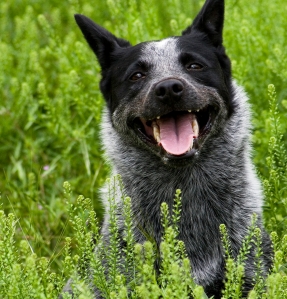The air is still  tempered by the coolness of night, though there is a blunt edge of heat against my back forecasting a warm afternoon that will serve as a prelude to the burgeoning months of summer swelter. I am reminded that soon I will need to begin making an earlier start on my morning walk to avoid the West Texas sun that blisters soil and flesh even in the morning. Not to walk is not an option; my soul longs for this daily journey as much as Spur’s instinct demands it. It’s a journey that isn’t about a destination or goals or expectations, although it started that way years ago. Over time, the original sense of obligation and drive toward end results was eroded and replaced by the quiet ritual that now moves my body down this familiar road.
tempered by the coolness of night, though there is a blunt edge of heat against my back forecasting a warm afternoon that will serve as a prelude to the burgeoning months of summer swelter. I am reminded that soon I will need to begin making an earlier start on my morning walk to avoid the West Texas sun that blisters soil and flesh even in the morning. Not to walk is not an option; my soul longs for this daily journey as much as Spur’s instinct demands it. It’s a journey that isn’t about a destination or goals or expectations, although it started that way years ago. Over time, the original sense of obligation and drive toward end results was eroded and replaced by the quiet ritual that now moves my body down this familiar road.
Somehow, this simple, repetitive migration brings balance to my life. The clumsy rhythm of my body seems to keep time with the pulse of the world aroun d me, and I remember with humility my place in nature. The constructed division between my humanity and everything else falls away from me like scales from the blind man’s eyes. Spur, trotting along steadily at my side, seems to relish the experience as much as I do. I feel her body relax as she, too, finds serenity on this road that divides wilderness and wheat. She has left behind the hunter, the herder, the bullier of other dogs, and merely exists, as I do, in the simplicity of this ritual. She is more than just my companion; I am dependent upon her to find meaning in my own movement through this place. And I think, maybe, she is dependent on me too.
d me, and I remember with humility my place in nature. The constructed division between my humanity and everything else falls away from me like scales from the blind man’s eyes. Spur, trotting along steadily at my side, seems to relish the experience as much as I do. I feel her body relax as she, too, finds serenity on this road that divides wilderness and wheat. She has left behind the hunter, the herder, the bullier of other dogs, and merely exists, as I do, in the simplicity of this ritual. She is more than just my companion; I am dependent upon her to find meaning in my own movement through this place. And I think, maybe, she is dependent on me too.

Our usual route takes us past houses and pavement onto a country road. To the north is an expansive fallow pasture. I look out at it and wonder what communities of what creatures live undisturbed under cover of tall prairie grasses, wildflowers, and other vegetation. To the south, a large field swells with the rippling, waving, gold of whiskery wheat. Months ago, when the rest of the land was still barren  and brown under the cold shroud of winter, this wheat crop sprang up, splashing vibrant, laughing green across the landscape. Now, it is nearly ripe for harvest, a venerably-bearded crop. It no longer laughs but whispers soothingly to me as the wind rustles the stiffening stalks, which bend less readily than they used to.
and brown under the cold shroud of winter, this wheat crop sprang up, splashing vibrant, laughing green across the landscape. Now, it is nearly ripe for harvest, a venerably-bearded crop. It no longer laughs but whispers soothingly to me as the wind rustles the stiffening stalks, which bend less readily than they used to.
The land out here has character. I think that’s something that many people who live their whole lives within the carefully cultivated and largely paved borders of cities don’t know. Many people who live out here and are content to simply drive by it don’t know either. But traveling through the land by foot or on horseback, a person gets a feeling for a place’s character. I have traveled this stretch of road often–a mile and a half down to Bumper Gate Road, a mile and a half back home again, day after day. I have learned the land by heart. When I think of Texas, I think of this place first, of wheat and wilderness and vastness under endless blue sky. And when I come back to visit and walk this road, I will feel as if I am with an old friend.
to simply drive by it don’t know either. But traveling through the land by foot or on horseback, a person gets a feeling for a place’s character. I have traveled this stretch of road often–a mile and a half down to Bumper Gate Road, a mile and a half back home again, day after day. I have learned the land by heart. When I think of Texas, I think of this place first, of wheat and wilderness and vastness under endless blue sky. And when I come back to visit and walk this road, I will feel as if I am with an old friend.
For now, though, I enjoy being out here traveling through the beauty and simplicity of this place with Spur. That blunt-edged heat has begun to intensify and overcome the coolness, which I now feel only in the playful breeze that brushes lightly across my skin now and then. I’m on the  homeward leg of this journey now, watching birds fluttering around the trees to the north through air that is lightly perfumed by the wildflowers growing abundantly in the field and the road ditches. I listen to the steady sound of Spur panting at my side, my own rhythmic breath, and the sound of my feet crunching over the gravel on the road.
homeward leg of this journey now, watching birds fluttering around the trees to the north through air that is lightly perfumed by the wildflowers growing abundantly in the field and the road ditches. I listen to the steady sound of Spur panting at my side, my own rhythmic breath, and the sound of my feet crunching over the gravel on the road.
I stitch myself into this landscape with every step I take.
683 words
 but I do need to be nurturing.
but I do need to be nurturing.